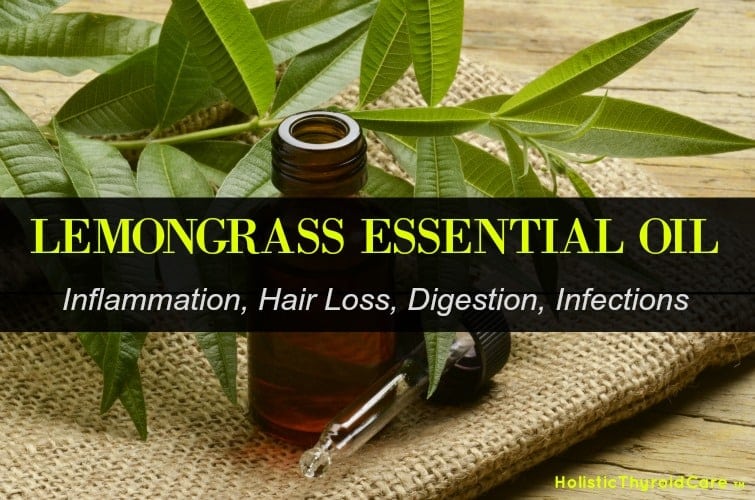
Benefits of Lemongrass Essential Oil
Lemongrass essential oil is one of my all time personal favorites; it’s actually one of my main go-to essential oils that use on a regular basis for a variety of issues. Lemongrass is particularly good for inflammation, hair loss, digestion, and infections. If you have Hashimoto’s or other any thyroid or autoimmune conditions, you probably already know all too well how “mini autoimmune attacks” (as I like to call them) or a flare in symptoms tend to rear their ugly head from time to time.
Lemongrass (Cymbopogon flexuosus or Cymbopogon citratus) has historically been used for digestion, purification, inflammation, hypertension, fever, and sedation. In a 2008 study, out of 91 single essential oils tested against Methicillin-resistant Staphylococcus aureus (MRSA), lemongrass was found to “remarkably inhibit its growth” [in the Petri dish]. There are also many other research articles documenting antibacterial and antifungal properties of lemongrass.
You may be familiar with lemongrass in Asian inspired meals. Fresh lemongrass is also great for making a cup of tea. There are actually more than 50 varieties of lemongrass and not all of them are recommended for medicinal purposes or for consumption. C. flexuosus and C. citratus are the two varieties that have been most scientifically studied.
Lemongrass Essential Oil – Benefits and How to Use
- Hair Care: Hair loss or thinning is common in thyroid & autoimmune conditions. Lemongrass has been shown in research studies to strengthen hair follicles and improve the condition of the scalp. Be sure you dilute it with a carrier oil to prevent irritation or burning. Something like fractionated coconut oil or any oil derived from almond, sesame, or avocado. Apply to scalp and rinse.
- Inflammation or Pain: Dilute 1 part lemongrass essential oil with 4 parts of a carrier oil and apply to any painful or inflamed area. I often apply it over my thyroid area, shoulders joints. As an analgesic and an anti-inflammatory, lemongrass regenerates connective tissues and ligaments, dilates blood vessels and improves circulation. Lemongrass is one of the top six essentials that has anti-inflammatory properties.
- Digestion: Lemongrass has long been a beloved essential oil for detoxification and the assimilation of nutrients due to its overall therapeutic effects on the functioning of digestive organs. It also helps with fluid retention by increasing urine production which helps eliminate toxins from the body and the formation of excessive gas. The general recommendation is to dilute 1 part essential oil with 4 parts of vegetable oil (I use olive, almond, or macadamia nut oils) in a veggie capsule. Do not use long term.
- Infections: Lemongrass has been studied and used successfully for bladder infections, respiratory/sinus infections, parasites, ringworm, athlete’s foot, Candida (yeast), Salmonella, and MRSA infections. It can kill both external and internal (and fungal) infections. Weber State University (Utah) studied the use of lemongrass in MRSA infection and found that out of 91 essential oils tested, lemongrass ranked highest in inhibiting the bacteria. Never diagnose or treat an infection yourself! Be sure to consult with a physician first.
Lemongrass should be used in small quantities and with a carrier oil. It’s aroma is very strong and if you don’t dilute it with a carrier oil you can burn, injure, or irritate your skin. It’s wise to do a small patch test with lemongrass in particular. If you notice any significant discomfort (lemongrass will usually initially cause a mild burning sensation), a burning sensation that doesn’t go away in a few minutes, or a rash, then do not use lemongrass. Also, if you have any of the following conditions: diabetes, liver or kidney disease high blood pressure, or reactive hypoglycemia, be sure to discuss using lemongrass with your doctor. Same applies if you are pregnant or nursing.
My favorite ways to use any essential oil is either topically or by diffusion in the air. Although there are sometimes indications for it, rarely do I personally use or suggest to others that essential oils be used orally. There is a lot of controversy about using them internally and it really depends on the issue and the person…particularly the health of their gut. My rationale as an autoimmune & thyroid nurse and nurse-nutritionist is that if you aren’t absorbing vitamins & minerals from food or supplements optimally, then why would you ever take an essential oil internally? Essential oils are volatile oils that certainly may have beneficial and therapeutic effects when used correctly.
References:
- Beautiful Earth
- Buzzle.com October 31, 2011
- Essential oils pocket reference (6th ed., pp. 86-87). (2014). Orem, UT: Life Science Publishing.
- Wellbeing August 14, 2013
- Wellbeing February 20, 2013






